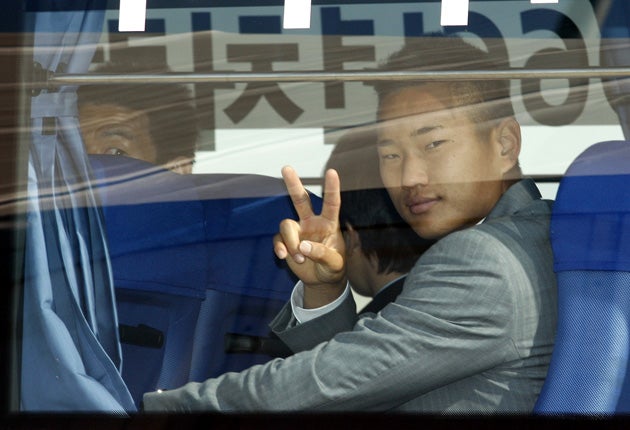How did North Korea's Rooney wow his own squad? He showed them his mobile phone
World Cup Lives: 'Everyone thinks that we cannot win against Brazil but we will play with a brave heart'

Only those with an incorrigible weakness for the underdog seem likely to embrace the cause of North Korea. For one thing, political isolation has contaminated what might otherwise be the most romantic of World Cup adventures. And any inclination to sympathy for the pariahs of the tournament, when they begin the toughest campaign of all against Brazil today, is unlikely to be nourished by the negativity of their tactics.
But if they present a wall to the world, both on and off the pitch, then it is undeniably held together by some pretty adhesive mortar. And in Jong Tae-se, they have a man capable of renewing the miracle of their one previous World Cup, in 1966. Then, too, the North Koreans arrived behind a skein of mystery, stretched between the hostile caricatures of global politics. The British government even considered denying visas to the players, but decided not to risk the right to host the tournament. As things turned out, the people of Middlesbrough formed an affectionate bond with their guests – and watched, delighted, as they stunned the Italians at Ayresome Park.
The exact spot where Pak Doo-ik fired the ball past the Italian keeper is preserved to this day, albeit now in a front garden in Holgate Close, by the bronze imprint of a football boot. The North Koreans then raced to a staggering three-goal lead in the quarter-final, against Portugal, only for Eusebio to orchestrate five in reply.
A terrible draw means that after today's clash of cultures they must again meet the Portuguese, not to mention the Ivory Coast. But Jong, as the only name to transcend the squad's studied anonymity, plainly feels quite at home with the prospect. He has breezily announced his intention to score in each game, before signing for a Premier League club.
In East Asia, already, he is widely viewed as commensurate with Park Ji-sung of Manchester United, South Korea's most recognisable migrant. Jong's muscular, combative play for Kawasaki Frontale, in the Japanese league – not to mention 15 goals in just 22 internationals – has earned him the soubriquet of "the People's Rooney". One of only three members of the squad playing abroad, Jong scored two absolute belters in a 2-2 warm-up with Greece.
Jong, 26, has spent his life in Japan but was raised and educated among a patriotic Korean diaspora. There have been suggestions in Seoul that he might have traced his roots south of the border instead, but he denies this emphatically.
Should he not look out of place today, Jong would certainly be an affordable option for an enterprising Premier League chairman. But even reported wages of £4,000 a week, in the J-League, place him way beyond the ken of most of his colleagues in the national squad, many of whom play for an army team.
Jong admits to having been irritated, at first, as they wonderingly passed his mobile phone around. But he has come to see their team spirit, underpinned by months of physical preparation, as a genuine threat to opponents with greater technique and experience. "Everyone thinks we cannot win against Brazil," he says. "But we will play with a brave heart. Ours is the strongest team spirit in the world."
That is certainly how they qualified, an epic journey that began in 2007 against Mongolia and took in a series of emotive showdowns with South Korea. But it is notable that the players themselves, either side of the 38th parallel, tend to speak decorously of football as a stimulus to peace and, in South Africa, mutual pride. Jong himself has appeared in commercials with Park, and has a column that appears in Seoul. "Sport can unite people," he says.
The chances are, however, that his endeavours will not even be seen back in North Korea. Any television coverage is likely to be delayed until results are known. Kim Jong-il would doubtless have mixed feelings should Jong, however briefly, start to win friends for a rogue state – especially if he then proceeds to enjoy wealth and freedom in the West. But this is the kind of thing a World Cup can do. It can show a dictator that faceless masses are comprised of individuals, with their own dignity, their own rights to attention. And it can show his enemies exactly the same. "North Korea is a mystery to people," Jong says. "No one knows about it. But I want to change the image of North Korea."
Subscribe to Independent Premium to bookmark this article
Want to bookmark your favourite articles and stories to read or reference later? Start your Independent Premium subscription today.

Join our commenting forum
Join thought-provoking conversations, follow other Independent readers and see their replies